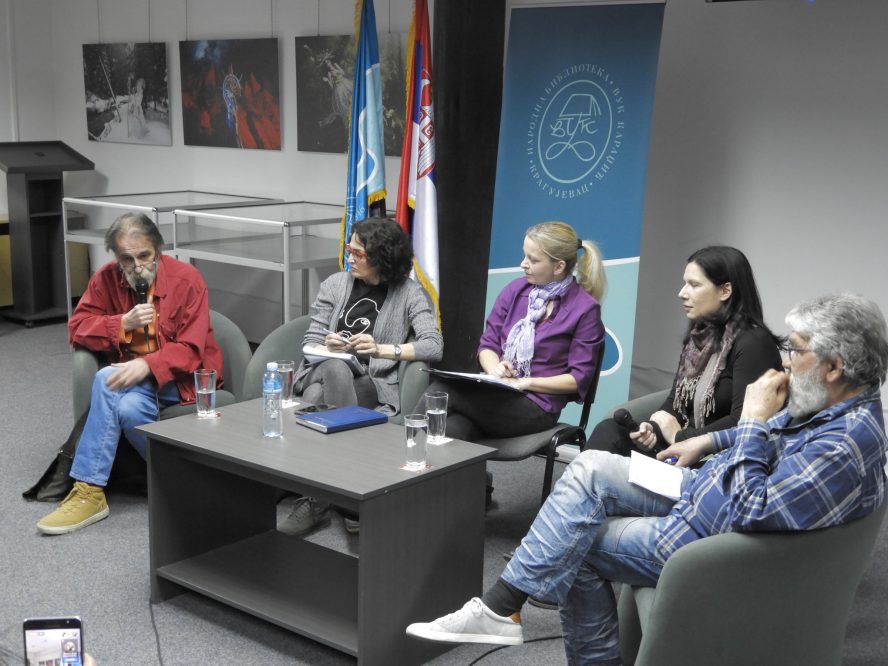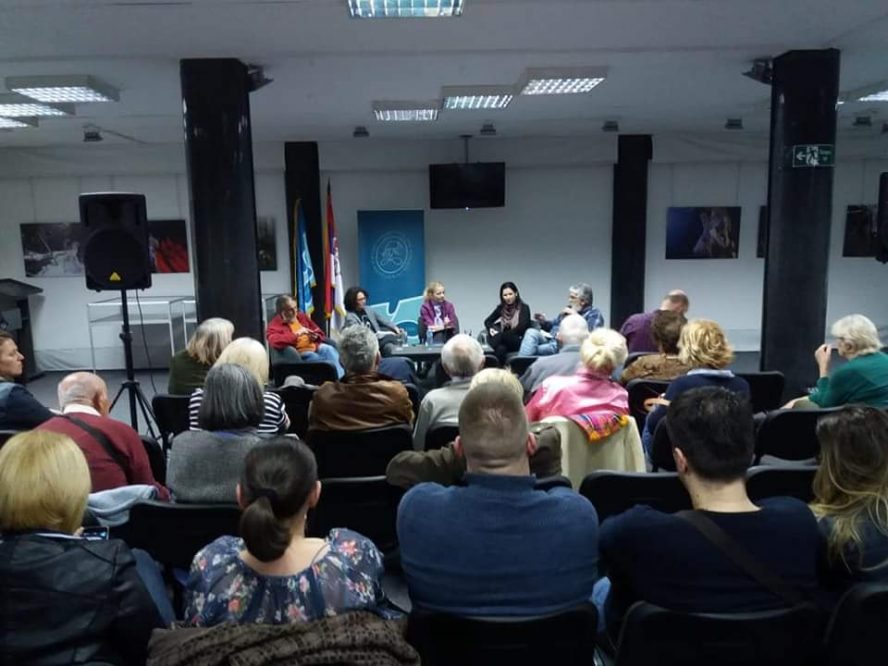On Friday, 8 March, the Centre for Peacebuilding in Kragujevac organised a round table at the Vuk Karadžić National Library on “Violent speech in the media and on social networks – verbal violence or freedom of expression”.
Participating in the discussion were Marija Obrenović (reporter for the portal Pressek), Miroslav Jovanović (reporter and editor of Kragujevačke novine), Miroslav Miletić (host of the Iz glave talk show) and Katarina Milićević, activist from the Centre for Nonviolent Action Belgrade/Sarajevo.
Ivana Đorđević was the moderator.
First, to introduce the organiser: The founding of the Centre for Peacebuilding in early 2018 was initiated by Gordana Jocić, a reporter and editor at Radio Zlatousti, after she completed basic training in peacebuilding organised by CNA. She wanted to gather motivated fellow citizens and develop an organisation around peacebuilding. It was conceived to act locally, because as a victim of the Second World War, the town of Kragujevac has a responsibility for being active in peacebuilding and promoting peace as the highest value of life. She was joined by a group of Kragujevac citizens, reporters, professors, psychologists, and in the spring of last year also by Ivana Đorđević, a reporter who attended the Mir-Paqe-Mir training organised by CNA. Since then, without any sources of financing, but with all its members volunteering their time, the organisation has put together a number of activities that have elicited a high level of interest. Just in March this year, in addition to the round table on violent speech, a public discussion was also organised titled “Ask the Children about War” about childhood memories of the NATO bombing of Serbia and Kosovo.

At the start of the round table on violent speech in public spaces, Miroslav Jovanović, editor and reporter for Kragujevačke novine, reminded the participants that he had learned from his professors to always address people by their name and job title, and never in any other way. In public speech, you may not use nicknames, if they are in any way offensive to an individual or social group. He concluded that our speech has become mired in slander, lies, obscenities, insults, street speak, slang, and that such language – the language of violence, hatred, disrespect – is the result of a collapsing system of values and a reflection of our polarised society.
I really cannot bring myself to use headlines with screaming letters, exclamation marks, click-bait headlines, even if it means losing touch with readers, with the younger generations on the internet. Unfortunately, much of the media opts to work this way, and the advertisers are not interested in the content, only in the clicks, said Marija Obrenović, reporter for the portal Pressek.
Katarina Milićević from CNA pointed out that people who use hate speech are not just “other people”, they are us, we almost all use hate speech on social networks and we must start from ourselves when we want to discuss this.
We are the ones who make up society, we individuals, so the question is why is there hatred in us. I would define hatred as when you don’t see the person next to you as an equal, but as non-human and when you treat them accordingly. But this is also when you stop being human. The atmosphere of violence in society is controlled by the state. We live in a violent society and every day, each of us is exposed to some form of violence.
The Kragujevac-based reporter and host of the talk show Iz glave Miroslav Miletić said that he has long been thinking about making a show that uses only curse words, because the language we hear in public space, in the media and on social networks, has become so polluted that the next stage is using exclusively curse words.

The audience also participated in the discussion, offering examples of when they were victims of violent language and actions.
At the end, Katarina Milićević explained that Miroslav Jovanović was exposed to a kind of structural violence – namely, he was convicted for articles published in the Svetlost newspaper in 2004, and in one of the cases, the judge also sued the newspaper, but was then the presiding judge in the panel that convicted Jovanović.
We believe this is all done to exert pressure on reporters and the media, and we call for solidarity from citizens, because Jovanović is being threatened with eviction and with being deprived of 2/3 of his already meagre pension.
The radio show broadcast on Radio Zlatousti with the most interesting parts of the discussion is available HERE